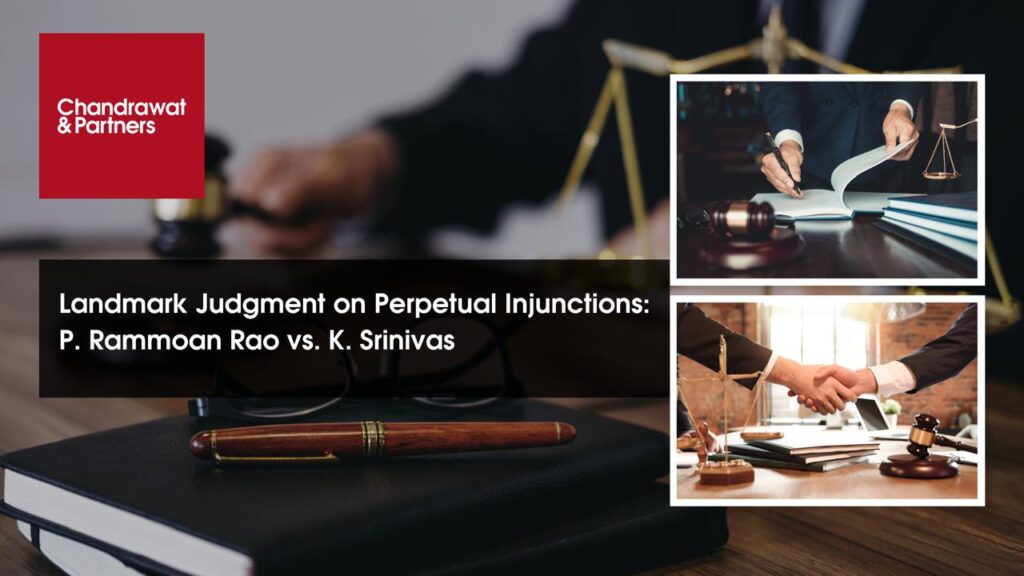Home > Recent Judgements >Landmark Judgment on Perpetual Injunctions: P. Rammoan Rao vs. K. Srinivas
Feb 13, 2025
Landmark Judgment on Perpetual Injunctions: P. Rammoan Rao vs. K. Srinivas
On February 13, 2025, the Supreme Court of India delivered a landmark judgment in the case of P. Rammoan Rao vs. K. Srinivas (SLP(C) No. 4036-4038/2024), addressing critical issues related to the execution of decrees granting perpetual injunctions. This ruling has significant implications for the legal community, as it clarifies important aspects of limitation laws and the enforcement of civil court judgments.
Case Overview
The case revolved around the execution of decrees that involved the grant of perpetual injunctions. Perpetual injunctions are court orders that prevent a party from doing a particular act indefinitely. These are typically issued when a court believes that the defendant’s actions are unlawful and that continuing with those actions will cause harm to the plaintiff. The judgment in P. Rammoan Rao vs. K. Srinivas specifically dealt with whether the execution of such injunctions is subject to any period of limitation.
Key Issues Addressed by the Court
The primary question before the Supreme Court was whether there is a limitation period for the execution of decrees that grant perpetual injunctions. The concept of limitation refers to the time within which legal action must be initiated. In the Indian legal system, civil suits, including execution proceedings, are generally governed by the Limitation Act, 1963, which provides a specific time frame for filing certain applications and actions.
However, perpetual injunctions, by their nature, are intended to last indefinitely unless altered by a court order. This posed a unique issue: should the execution of a perpetual injunction decree be subject to a limitation period, or should it be enforceable at any time, even if years or decades have passed since the decree was originally passed?
The Supreme Court’s Ruling
The Supreme Court ruled that the execution of decrees granting perpetual injunctions is not subject to any period of limitation. The Court’s reasoning was based on the fact that a perpetual injunction does not have a fixed end date. Unlike other types of decrees that may expire after a certain time or upon completion of a particular act, a perpetual injunction continues to be enforceable indefinitely unless the court modifies or vacates the order.
The judgment also clarified that the limitation law, which sets time constraints for filing suits or applications, does not apply to the enforcement of perpetual injunctions. This is because the purpose of a perpetual injunction is to offer ongoing protection to the plaintiff, and there is no prescribed time within which such protection should cease.
Implications of the Judgment
- Clarification of Legal Ambiguities: Prior to this judgment, there was some ambiguity in the legal community about whether the limitation period applied to the enforcement of perpetual injunctions. This ruling provides much-needed clarity for lawyers, courts, and litigants, ensuring that perpetual injunctions can be executed at any time.
- Strengthening the Power of Injunctions: By affirming that perpetual injunctions are not bound by a limitation period; the Court has reinforced the importance of these orders in safeguarding the rights of individuals. This judgment ensures that individuals who have obtained such injunctions can rely on them for ongoing protection without worrying about time constraints.
- Legal Precedent for Future Cases: This ruling sets an important legal precedent for similar cases in the future. It establishes that perpetual injunctions, being inherently continuous in nature, are not subject to the same limitations as other types of decrees. This clarification is likely to be cited in future litigation involving the enforcement of injunctions and other similar orders.
- Impact on Enforcement Proceedings: The judgment also provides direction to lower courts and judicial authorities when dealing with the execution of injunctions. The absence of a limitation period for perpetual injunctions simplifies the enforcement process, particularly in cases where the defendant continues to violate the terms of the injunction years after the decree has been issued.
Conclusion
The Supreme Court’s judgment in P. Rammoan Rao vs. K. Srinivas is a landmark decision that clarifies a key aspect of civil procedure law regarding the enforcement of perpetual injunctions. By ruling that the execution of such decrees is not subject to any period of limitation, the Court has ensured that individuals who are granted perpetual injunctions can seek enforcement at any point, regardless of time elapsed.
This decision has far-reaching implications, reinforcing the significance of perpetual injunctions as a tool for protecting legal rights without time constraints. It is expected to provide greater confidence to litigants and legal practitioners, knowing that such orders are enforceable indefinitely, providing continuous legal protection where necessary.
As the legal landscape continues to evolve, this judgment will serve as an important reference point for future cases, helping shape the enforcement of civil decrees in India.
For more information or queries, please email us at
[email protected]





